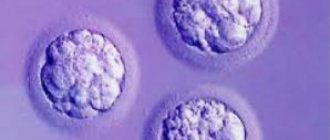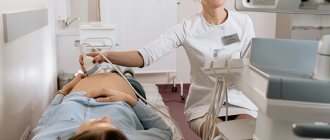How long does it take for signs of pregnancy to appear?
The initial signs of pregnancy appear in the second or third week after the end of menstruation, that is, about a week before the calendar start of the next menstruation.
Mucus discharge during pregnancy
Before the onset of menstruation, most women experience thick and scanty discharge called “leucorrhoea.”
After fertilization, due to the high level of progesterone, the work of the cervical glands, which produces mucus, is activated. Therefore, from the first days of conception, mucous discharge becomes more abundant, transparent and has a liquid consistency. It is this secret that protects the pregnant woman and the fetus directly from pathogenic microorganisms.
Thrush during pregnancy
The secretion secreted by the uterus is rich in hydrogen ions, so yeast easily multiplies in it, causing thrush, accompanied by white curdled discharge, itching and burning in the vaginal area.
Candidiasis during pregnancy can also develop against the background of a disturbance in the vaginal microflora.
To avoid intrauterine infection of the fetus, if signs of thrush appear, you should immediately consult a doctor.
Frequent urination during pregnancy
Often, increased frequency of urination is observed in late pregnancy, which is caused by the growth of the fetus in the womb and its pressure on the bladder and ureter.
But even in the first weeks of bearing a child, the urge to urinate may become more frequent, both during the day and at night, which is associated with increased blood circulation in the pelvic organs.
The expectant mother feels as if her bladder is full, and a small amount of urine is released during urination.
If frequent urination does not cause any discomfort, there is no need to worry about it.
Cystitis during pregnancy
Increased urination during pregnancy, accompanied by pain in the groin, burning in the ureter and increased temperature, may be a symptom of cystitis - a disease that often develops in the early stages of pregnancy due to a sharp decrease in immunity, increased susceptibility to bacteria and exacerbation of inflammatory processes.
Temperature 37 as a sign of pregnancy
An increase in body temperature to subfebrile levels (37.2 - 37.4 ° C) in the early stages of pregnancy in the absence of symptoms of viral diseases is normal in 8 cases out of 10. And it is explained by the increased production of progesterone, which affects the thermoregulation center, as well as physiological immunosuppression, which protects the body of a pregnant woman from rejection of the fetus.
A rise in temperature to 37.5°C should be a reason to visit a doctor.
Increase in basal temperature during pregnancy
This sign of pregnancy is informative only in the first 2 weeks after conception, after which the basal body temperature stabilizes.
Pregnancy is indicated by an increase in basal temperature for several days in a row to 37.0 - 37.2 ° C.
It is important to measure basal temperature correctly: the thermometer is inserted into the rectum immediately after waking up in the morning, without getting out of bed. It is recommended to carry out this procedure every day at the same time for several days.
Bloating (flatulence) during pregnancy
Starting from the early stages of pregnancy, intestinal motility is disrupted, which leads to increased gas formation and bloating.
Thus, already in the first weeks of conception, pregnant women may experience a feeling of excessive fullness in the abdomen, accompanied by a tingling sensation radiating to the uterus.
Constipation and diarrhea during pregnancy
Sex hormones produced during pregnancy inhibit the functioning of the intestines, causing it to relax, which causes constipation or, on the contrary, diarrhea. At the same time, constipation most often torments pregnant women in the later stages of pregnancy, while diarrhea is more typical in the first month of pregnancy.
Hemorrhoids during pregnancy
Frequent constipation and blood flow to the pelvic organs can provoke the formation of hemorrhoids, which mainly form in late pregnancy.
However, if before pregnancy a woman suffered from hemorrhoids, then this pathological condition often worsens in the first few weeks after conception.
Leg cramps during pregnancy
Cramps and pain in the legs often bother pregnant women at night. Cramps are manifested by involuntary sharp and painful contraction of the calf muscles.
To eliminate cramps, follow these recommendations:
- Stand on your flattened leg. If acute pain prevents you from moving your leg, you must, overcoming the pain, pull your foot towards you.
- Rub the cramped muscle using pinching and patting.
- Make a hot foot bath with salt.
Treatment methods
Severe manifestations of the disease require specialized medications. Self-medication can be harmful, so you should definitely consult with specialists from JSC “Medicine” (clinic of academician Roitberg). This way there will be no risk of harm to the fetus.
Treatment principles:
- mild form does not require treatment. It all comes down to observation;
- elimination of vomiting;
- choleretic drugs relieve symptoms and improve liver function;
- other prescribed medications will help get rid of muscle spasms, eliminate abdominal pain, lower blood pressure and overcome general weakness.
Medications are prescribed by qualified doctors based on test results. Conclusions and treatment based on them that are not supported by research are dangerous to health.
External signs of pregnancy
A change in a woman’s appearance already in the early stages may indicate pregnancy.
Acne during pregnancy
A sharp hormonal change in the body of a pregnant woman and increased activity of the sebaceous glands can trigger the appearance of acne, even if the woman has not previously encountered this problem.
Most often, the rash goes away after the baby is born and does not require any treatment.
If a pregnant woman decides to deal with rashes before delivery, then she should remember that during this period it is forbidden to use drugs that contain retinoids and salicylic acid. In addition, removal of rashes using laser, deep peeling, or mechanical cleaning is contraindicated. Phytotherapeutic procedures should also be treated with caution.
Facial redness during pregnancy
Such an early sign of pregnancy as facial redness is associated not only with hormonal levels, but also with increased blood circulation during this period.
Many pregnant women experience the so-called “pregnant mask”, which is characterized by the appearance of age spots localized in the forehead, cheeks and nose. You should not be afraid of such spots, since after childbirth they will go away on their own over time.
Veins during pregnancy
The onset of pregnancy may be marked by the appearance of venous patterns (or spider veins) on the chest, neck, arms and legs. Such spider-like patterns of dark red or bluish color, like skin pigmentation, will disappear on their own with the birth of the child.
Edema during pregnancy
In the early stages of pregnancy, slight puffiness of the face may be observed. In addition, your hands may swell, which is especially noticeable if you clench your hand into a fist.
It should be remembered that swelling in the first months of bearing a child is not normal and may indicate that the expectant mother has kidney disease or cardiovascular disease. Therefore, if this symptom appears, you should consult a doctor.
Breast enlargement during pregnancy
Many women, due to the absence of menstruation, may suspect pregnancy in the first weeks of conception due to breast enlargement by 1 - 2 sizes. Moreover, this sign can be observed even if a woman loses her appetite and loses weight.
Breast enlargement may be accompanied by pain and tingling in both mammary glands.
Important! During pregnancy, both breasts increase in size exactly the same. Enlargement of one mammary gland or any part of it should alert you, as it may signal the presence of serious diseases.
Nipple changes during pregnancy
Early signs of pregnancy are darkening and swelling of the nipples, as well as the appearance of Montgomery tubercles - small outgrowths localized in the nipple area. Outwardly, such formations resemble small warts that are filled with a sebaceous substance.
There is no need to worry about the appearance of such tubercles, since they in no way disrupt the functioning of the sebaceous glands and do not affect the health of the expectant mother, much less the fetus.
Pain and burning sensations that occur when touching the nipples may also indicate pregnancy.
Discharge from the breast during pregnancy
An early (albeit rare) sign of conception may be clear fluid released from the nipple when pressure is applied to it.
Sometimes, in early pregnancy, colostrum may begin to be released, which indicates galactorrhea, a condition in which there is increased production of the hormone prolactin.
In general, the appearance of colostrum is more typical in the second and third trimesters of pregnancy.
Stripe on the stomach during pregnancy
Many people believe that a brown line on the abdomen, running from the navel down, appears in late pregnancy. In fact, this line can be seen already in the first weeks of pregnancy, it will simply be white, whereas from the 12th week it will begin to acquire a brown tint.
Reasons to see a doctor
If you have severe PMS, delayed periods, pain in the stomach, or unnatural vaginal discharge, immediately go to the gynecologist. Diarrhea (diarrhea) is often observed in the event of a disruption in the menstrual cycle and the development of pathologies of the organs of the reproductive system, but is not one of their mandatory symptoms. It is not recommended to postpone examination by a doctor until the end of your critical days, since you may miss diagnostic signs of uterine disease.
Contact a gastroenterologist immediately if:
- systematic stomach problems;
- blood in vomit or stool;
- temperature;
- severe diarrhea (more than 8 times a day);
- diarrhea for more than 30 hours;
- signs of poisoning;
- unnatural color of feces or inclusions in feces (blackening, yellow, green mucus, etc.).
Call an ambulance immediately if bowel dysfunction is accompanied by increasing abdominal pain, a sharp deterioration in well-being, or with blood pressure below or above normal 100/70─120(140)/90 mm Hg. Art.
Signs of the first and second pregnancy
Are the early signs of the first and second pregnancy different? We answer: everything is purely individual. There are many cases where the same woman’s first pregnancy occurred against the background of severe toxicosis, while bearing a second child did not cause any problems.
In general, gynecologists identify the same early signs of pregnancy, regardless of whether it is the first, second or third. However, pathologies such as hemorrhoids and varicose veins during the second and subsequent pregnancies become aggravated already in the first weeks of gestation.
Diagnostic measures of toxicosis
Obvious symptoms do not give the right to independently diagnose toxicosis during pregnancy. The patient should be examined by a specialist. Doctors from various fields of our multidisciplinary medical center in the center of Moscow treat diseases. This depends on the strength of the disease and the presence of additional pathologies.
- Gynecologist. Qualified specialists will tell you how to deal with toxicosis using medications and other means. The pregnant woman will be explained the causes of toxicosis and how long toxicosis lasts. The doctor will listen to the symptoms of toxicosis of the pregnant woman and accurately outline the clinical picture. Toxicosis of the first pregnancy should not cause fear to patients either - the gynecologist’s task is to give confidence to future mothers. There is also the opportunity to ask a specialist about the timing - when toxicosis ends.
- Severe toxicosis and the presence of complications require an in-depth study of the patient’s condition by other specialists. Our clinic offers the opportunity to undergo examinations by a physiotherapist. The doctor will tell you how to alleviate toxicosis and reduce its effect on other organs.
- Personal problems will be resolved by a psychologist. A specialist will help resolve family problems until toxicosis ends. The psychologist will tell you how to combat toxicosis.
The family and the pregnant woman themselves should prepare in advance for the period when toxicosis begins. This is done at the stage of pregnancy so as not to unnecessarily irritate the woman. JSC "Medicine" (clinic of academician Roitberg) provides a full range of medical services for pregnant women in the Central District.
Signs of pregnancy while breastfeeding
Many women mistakenly believe that it is impossible to get pregnant while breastfeeding. This is wrong.
Let's look at the signs that may indicate that a nursing mother is pregnant again.
If your baby refuses to breastfeed for no apparent reason, consider purchasing a pregnancy test. The fact is that a new pregnancy provokes a change in the taste of breast milk, which acquires a bitter taste and becomes less sweet.
The consistency of the milk itself may change, as well as its quantity (up to its complete disappearance).
You should also pay attention to persistent hypersensitivity, as well as soreness of the nipples, especially if such signs were not previously observed during breastfeeding.
Darkening of the skin around the nipples may also indicate pregnancy.
The absence of menstruation, provided that it has already occurred after childbirth, can also be a sign of pregnancy.
Home measures to combat toxicosis
Folk remedies can alleviate mild forms of the disease. The pregnant woman and her relatives should take care to follow proven methods.
Home methods for treating toxicosis:
- good sleep;
- regular long walks;
- eating small portions, but often;
- refusal of fatty and salty foods;
- remove all foreign and unpleasant odors in the home that cause irritation;
- favorable psychological environment.
Don't give in to stress and overwork. Controlling your emotions will help you achieve a happy meeting with your newborn. Folk remedies will help you easily tolerate a simple form of toxicosis.
Laboratory and instrumental diagnosis of pregnancy
Regardless of whether you have subjective or external signs of pregnancy, the fact of conception can only be reliably confirmed using laboratory and instrumental diagnostic methods: transvaginal ultrasound and a blood test for hCG.
Thus, an ultrasound examination can determine pregnancy starting from the fourth week from the moment of conception. But in the first week of pregnancy, an ultrasound will only show the presence of a corpus luteum, which cannot be a reliable sign of the birth of a new life.
In the first 7 to 9 days after conception, in 98% of cases, pregnancy can be determined by a blood test for hCG , in which the human chorionic gonadotropin level exceeds 25 mU/ml. An increase in hCG levels during pregnancy is observed up to 12 weeks, after which it begins to gradually decrease.
At home, women use rapid tests .
Pregnancy test
An express pregnancy test, which can be purchased at a pharmacy, is recommended to be carried out no earlier than 2 to 3 days before the expected start date of menstruation. At the same time, manufacturers recommend using tests to determine pregnancy after 5 days of delay in order to avoid obtaining unreliable results.
The test is positive, but there are no signs of pregnancy
Some women are faced with a situation where an express pregnancy test gives a positive result in the absence of any signs of pregnancy, confirmed by a gynecologist and ultrasound.
The reasons for a false positive pregnancy test may be the following:
- Incorrect test: biomaterial (urine) is collected in the morning, and the last part is used.
- Using expired or defective test.
- Taking medications containing human chorionic gonadotropin (hCG).
- Hormonal imbalance due to the presence of tumor diseases and cysts.
- Early pregnancy failure.
- Abortion with incomplete removal of embryonic tissue.
- Ectopic pregnancy.
- Taking alkaloids, tranquilizers, and phenothiazane derivatives.
Test negative for early signs of pregnancy
Can a rapid test show a negative result if there are early signs of pregnancy? Maybe. And here are the reasons.
- Premature testing (remember that the most reliable results will be those obtained during the test on the fifth day of a missed period or more).
- Presence of tumors.
- Malfunction of the thyroid gland.
- Taking hormonal drugs.
- Ectopic pregnancy.
- Threat of spontaneous abortion.
- Violation of the rules for using and storing the test.
- Low quality or defective test system.
And remember that if you suspect pregnancy, no matter what the test result is - false positive or false negative, only visiting a gynecologist and carrying out all the necessary examinations will reliably determine whether you are pregnant or not.










